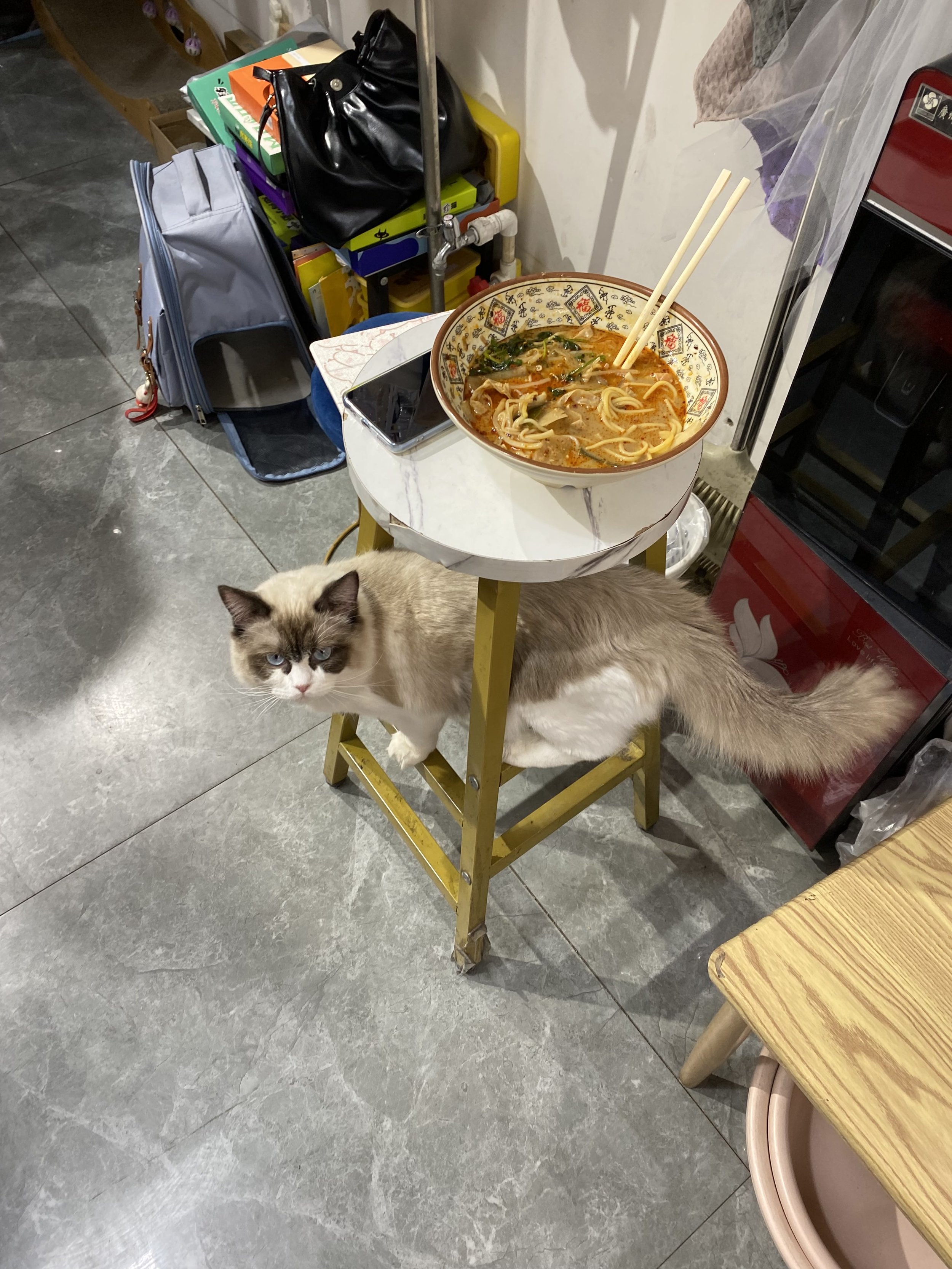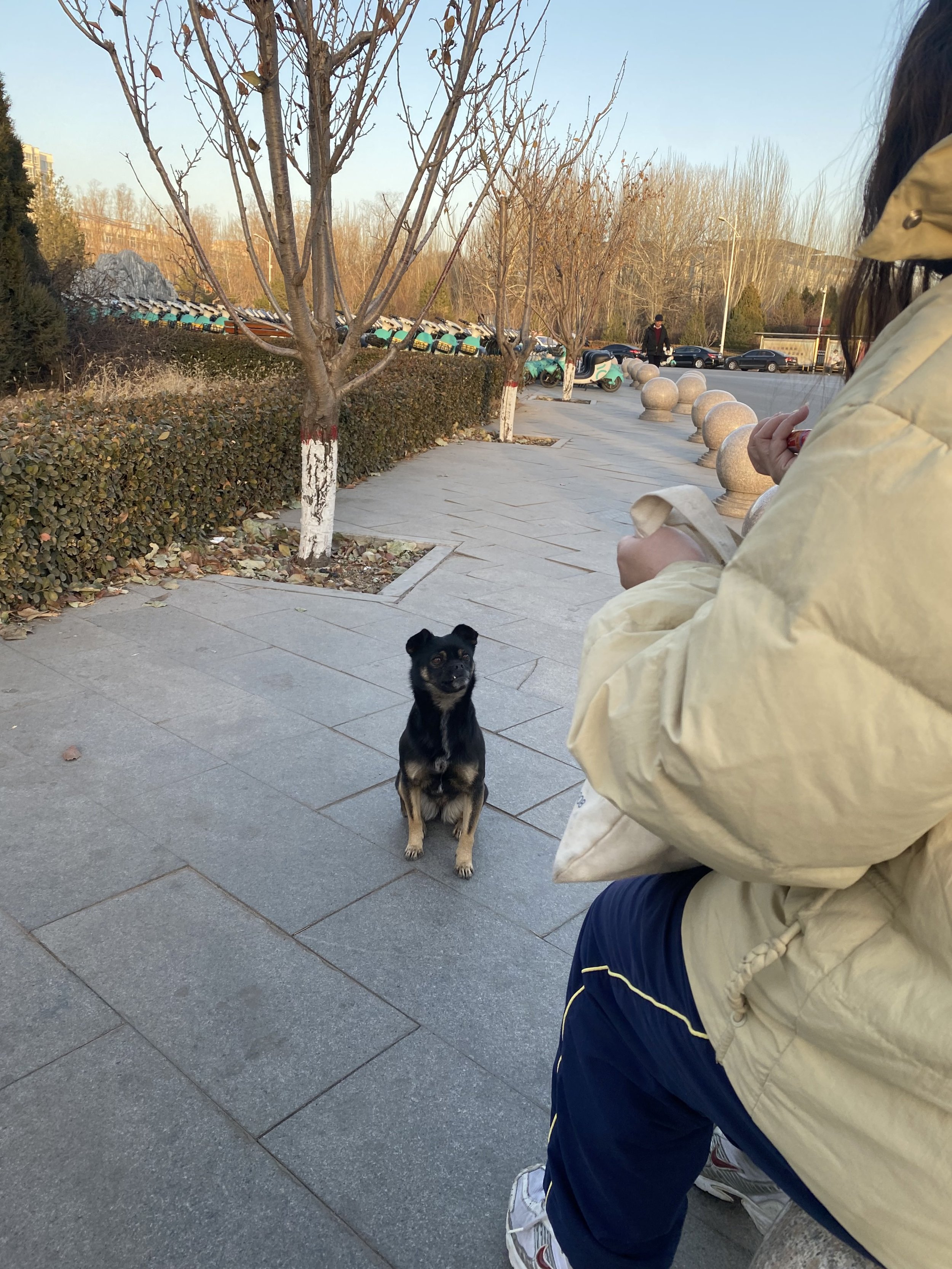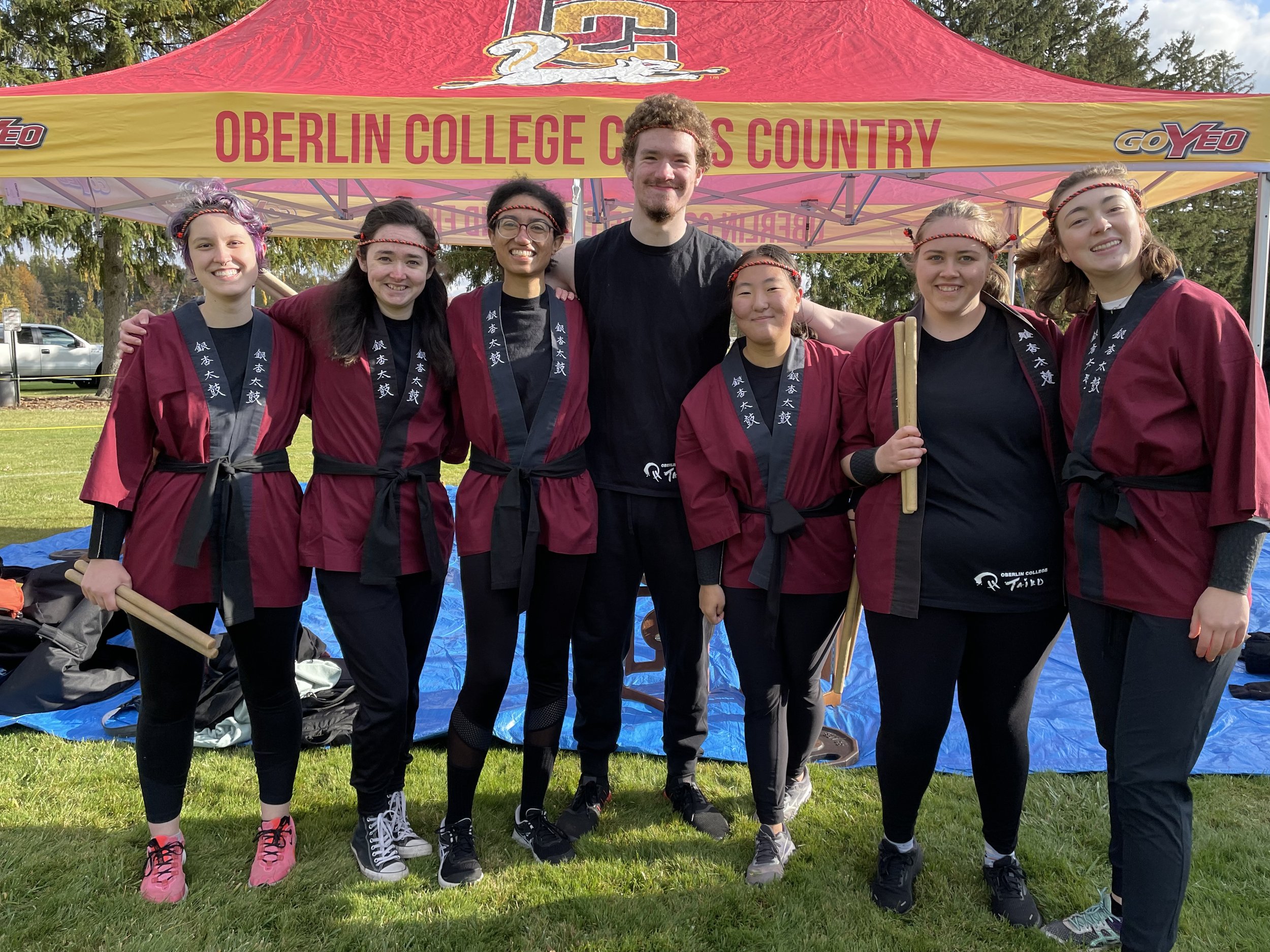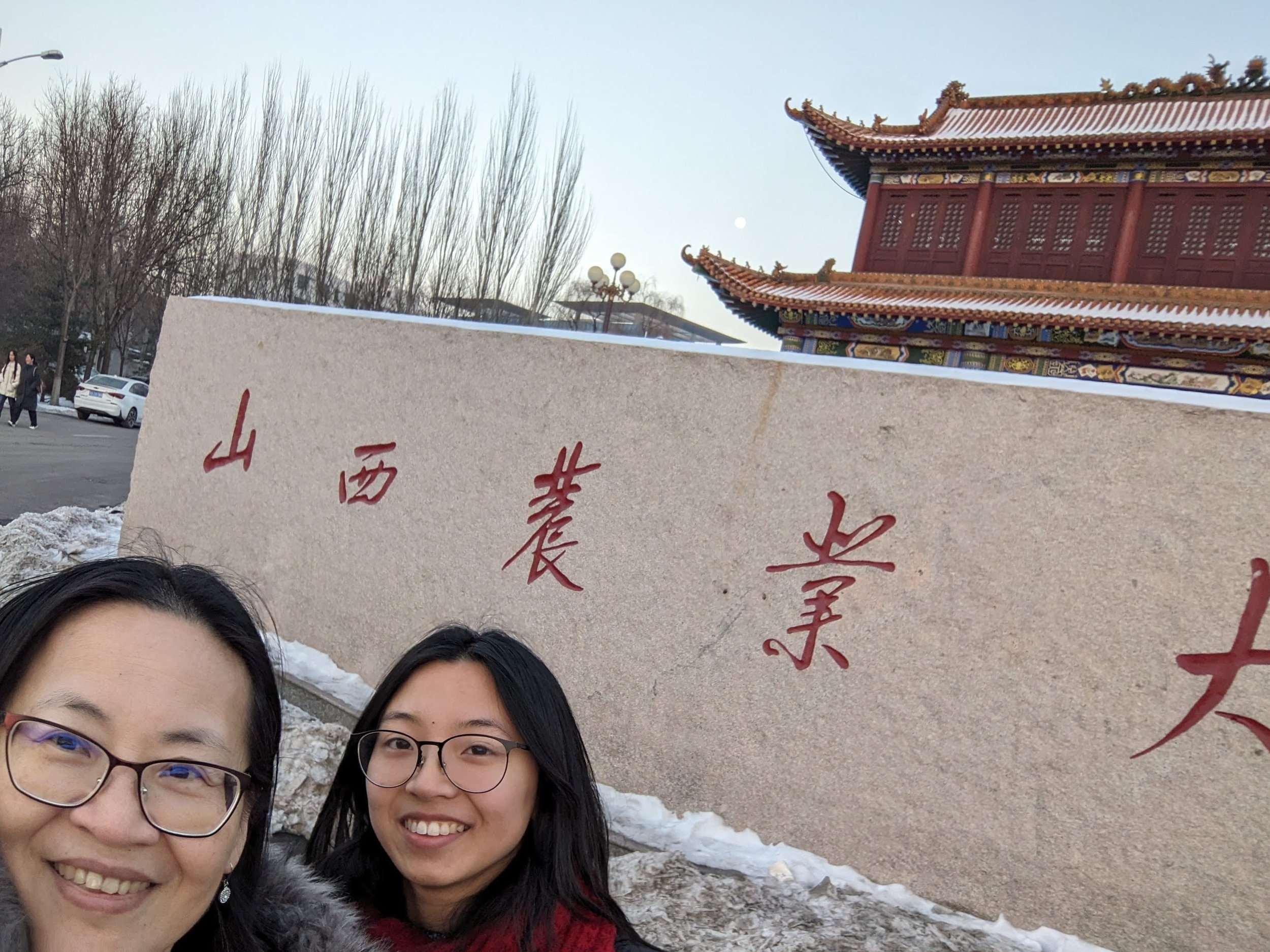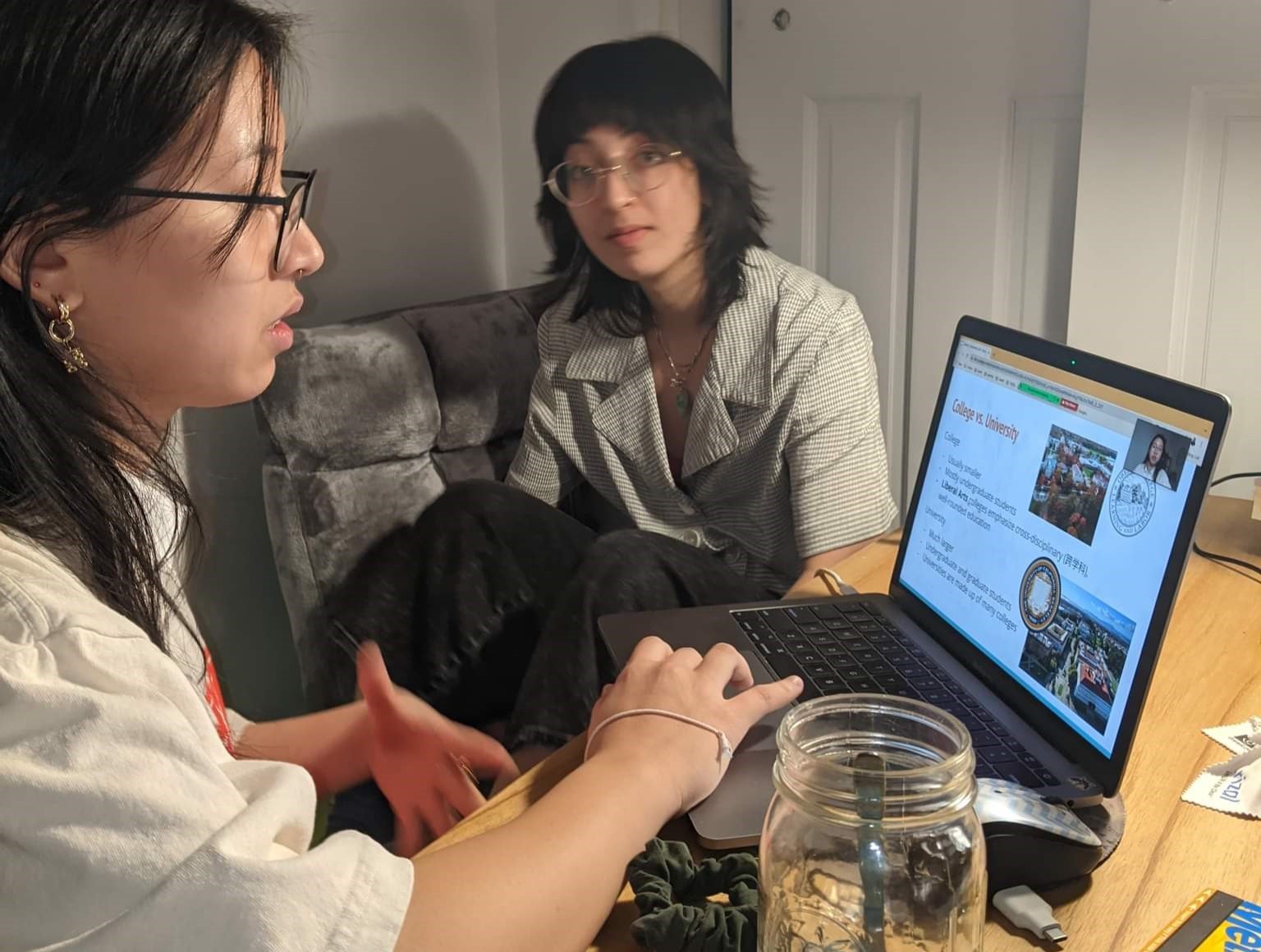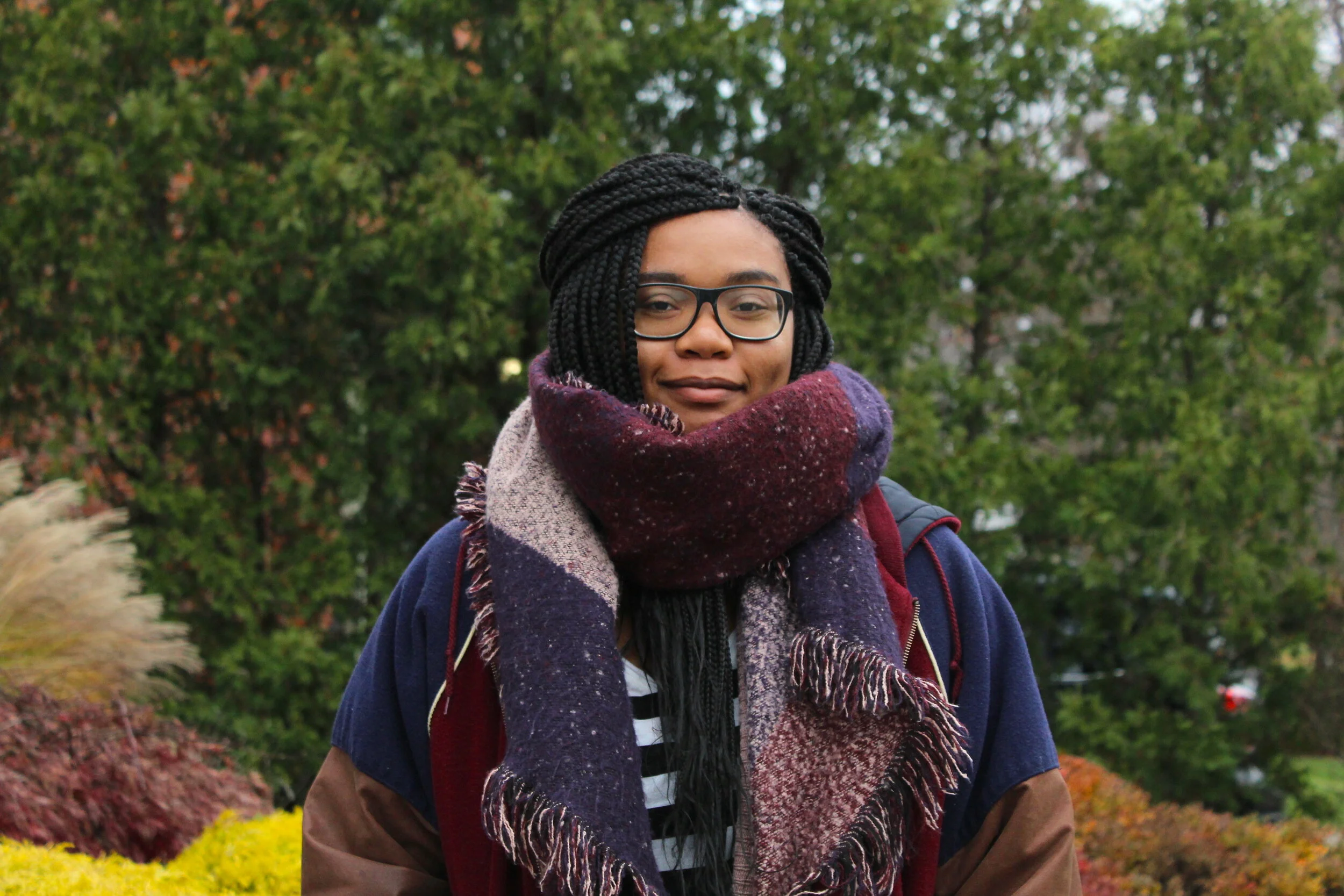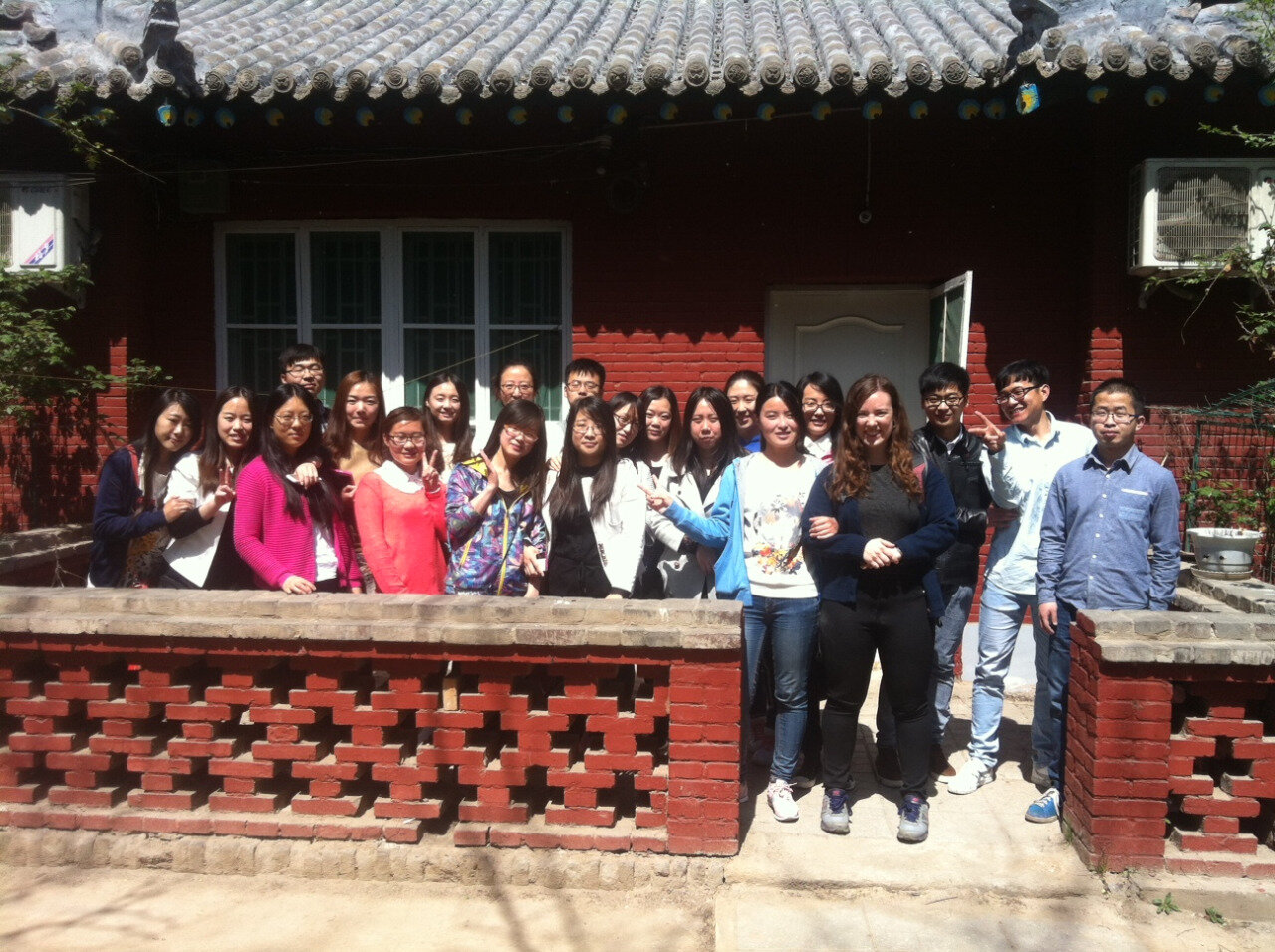
By Haley Sablay ‘23, Taigu Fellow
“What is the best piece of advice you have ever received?” read the Powerpoint slide at 11 am during a Masters class last spring semester. We were learning about giving and receiving advice, and this simple question seemed too big a feat not only for my groggy students but also for myself despite having a practiced answer the night before (I’m a planner, what can I say?). At the time, the best advice I could muster to most of my classes was “you only live once” and then proceeded to explain the term YOLO. Looking back, I wish I had given a different answer (even though my students found the term hilarious).
By Nissa Berle ‘24, Taigu Fellow
On my flight to Bangkok last December to meet up with my cohort, I was served a lunch of spaghetti and beef. The meal came with a wooden fork, and one would think that using any utensil would be like riding a bike… untrue, at least for me. In my four months living in Taigu, I apparently became so accustom to chopsticks, my fork skills have become rusty. My time away from Taigu during our winter break travels has helped me realize how familiar I’ve become with Taigu, sometimes in small ways I hadn’t expected.
By Dina Nouaime ‘23, Taigu Fellow
When I was a kid, my dad affectionally granted me the nickname ‘Noodles’. Though not shorter than my birth name by any means, ‘Noodles’ became as much of a catchy way to call me over as a signifier of my love for the versatile carb.
By Dina Nouaime ‘23, Taigu Fellow
In Taigu, the bus system is king. Sure, taxis and electric bikes are readily available, yet both fall noticeably short. Taxi? At least five times the price of an equidistant bus ride for an individual. Electric bike? I’d never hear the end of it from my parents if that became my go-to mode of transportation.
By Tiffany Yuen ‘23, Taigu Fellow
I dream about Taigu food. Truly, mealtimes are a cherished highlight of my days. One meal, in particular, that stood out was with students who introduced Haley and I to a traditional Shanxi cuisine restaurant. We ordered far more food than four people could finish: 拨烂子 (bō làn zǐ), a stir-fried wheat noodle dish, Peking duck, millet corn soup, 刀削面 (dāo xiāo miàn), the famed knife-cut noodles of Shanxi province, and my personal favorite, 红烧肉 (hóng shāo ròu), or braised pork belly.
By Tiffany Yuen ‘23, Taigu Fellow
In Taigu, my bedroom is my comfort zone: I have cultivated a cozy space, a space I have meticulously curated and personalized to represent what “home” feels like to me. The art I’ve collected from places I visit, some art of my own, photos of my family and loved ones, Anokha’s photography (@photonokha), tchotchkes and knick-knacks that make me happy, rocks and crystals I collected from California…they all have a special place on every wall, corner, and surface of my room.
By Mikael Frey ‘22, Taigu Fellow
At my encouragement, my parents came to visit me this winter. For months, I have been eagerly imagining their arrival. I hoped that, being here, they would see the thing that drew me here. The something I still cannot quite put into words. When I applied to Shansi, I only applied to this site.
By Mikael Frey ‘22, Taigu Fellow
Throughout my childhood and young adulthood, my parents have participated in a program at our local university. For a few months, they would host an international student in our home, helping them navigate the move to America. I was always fascinated as a child by these worldly people with interesting stories, accents, and futures. I remember an outgoing Dutch man who taught me simple words in his language and a quiet Japanese women who staying in touch with my mom for years after.
By Harper Ross ‘22, Taigu Fellow
“Walk slow.”
It’s a common way to say goodbye in China.
By Harper Ross ‘22, Taigu Fellow
How do you re-enter a place you’ve said goodbye to? How do you plan for the future when the parameters of your plan are ever-shifting? How do you put down roots when you know you will have to leave?
By Elaine Wu ‘21, Taigu Fellow
It is still hard to believe I am writing this, but after two years of remote teaching at Shanxi Agricultural University, I have finally arrived! I chose to extend my fellowship by another year to, at long last, taste what life is like as an on-site fellow. I was also committed to assisting in this period of readjustment and reintroduction as Shansi Fellows returned to Taigu for the first time since January, 2020.
By Elaine Wu ‘21, Taigu Fellow
My first year of college, I started creating what came to be known as “time capsule” playlists. Back then it started off simply as a matter of convenience, for having a shared spotify account at the time meant that I didn’t have a place to keep track of all my liked songs. Thus, having one chaotic mass playlist where I could store them offered a quick fix.
By Elaine Wu ‘21, Taigu Fellow
There is this Facebook group called “Foreigners Stuck Outside of China”, consisting of all kinds of people, trying to get into China for all kinds of reasons. Many are family, trying to get reconnected with relatives, partners, their pregnant wife and kids. Many for business, study, or opportunities like mine, and all of us desperately awaiting news to change for the better. It is quite humbling to read these posts of families unable to reconnect for years, the children that are born within the time, or seasoned professionals whose steady career paths have suddenly had a wrench thrown in their midst. It's a good reminder that I am young and growing.
By Jess Wilber ‘21, Taigu Fellow
As with many college students across the US that were sent home in March of 2020, I left knowing the chances of my return would be slim. My entire senior year was going to be spent abroad, beginning with a cross-continental environmental justice program during the fall and ending with a language immersion program in China during the spring. It felt like my entire college experience had been building towards this year abroad. Of course, by the time August rolled around, the pandemic was only getting worse.
By Rex Simmons ‘19, Taigu Fellow
My fellowship did not begin nor end as I expected it would. I was never able to travel to China due to Covid related travel restrictions, I was never able to secure a working visa in the two years that my application was sitting at the consulate, and I was never able to meet any of the students or staff at Shanxi Agricultural University in person. Instead, I was thrust into the watery realm of remote work, where I taught conversational English to students virtually, relying heavily on sitcoms to provide relatively interesting content and examples. I can’t say I saw it coming.
By Rex Simmons ‘19, Taigu Fellow
Working from home has been a striking adjustment for much of the global workforce. Some love it, some hate it, but the boons and banes of the hilarious juxtaposition of personal and professional lives has become a common trope in our lives, and is often parodied and celebrated in comics, commercials, and internet memes.
By Jenn Lin ‘20, Taigu Fellow
I wasn’t sure where to begin when I started writing down my reflections of this past semester. It felt like my Shansi experience had been incomplete. In March of 2020, I exited college abruptly and found myself back where I started. Even now, I’m still writing this report out of my childhood bedroom in New York.
Le’Priya White ‘19, Taigu Fellow
While rural China has its own challenges and the language barrier is real, I never felt more confident in my ability to live and travel abroad. I have the confidence to influence and motivate my students to keep pushing to learn because I knew what it was like to be discouraged from trying. But just like me, I never want them to give up.
Mackenzie Lew ‘19, Beijing Normal University Fellow
For me, authenticity is not so important. People move around, and so does their food. I think that chasing authenticity can sometimes dismiss the realities of where people are, and how they’re able to make food. I like to think about this especially when thinking about Chinese American food.
Radia Lahlou ‘18, Taigu Fellow
I love nostalgia. I love reminiscing. I love the warm yet somewhat melancholy feeling that comes from looking through old photos, retelling stories with good friends, or eating food that reminds me of a past time. So imagine my horror when I returned to Taigu after a long summer break to find I had left my journal, my entire record of the year prior, on a flight from Chicago to Beijing.
Radia Lahlou ‘18, Taigu Fellow
My succulent is withering, so I put her on the ledge by our front door in hopes that she, too, can feel the sun’s warmth. I like that her two branches are crooked from leaning towards the light, as if frozen mid-dance. I’ll sit next to the ledge and watch the wind float fluffy, cotton-like seeds through grandparents with grandchildren taking walks.
Andrew Boor ‘18, Beijing Normal University Fellow
Within my haste to busy myself, I began an internship at a contemporary art gallery in Beijing’s Caochangdi Art District and rapidly consumed as many books concerned with China’s rapidly transforming political economy as possible.
Brendan Nuse ‘17, Shanxi Agricultural University Fellow
I know a lot of people love having free time to relax, but I am not one of those people. When I have free time, I usually spend it all worrying about how I don’t know what to do with my time.
Brendan Nuse ‘17, Shanxi Agricultural University Fellow
KTV, which an internet search tells me stands for “karaoke television”, refers to private karaoke rooms. Whenever you feel the urge to belt out one of your favorite Mandopop hits, you can just grab a few friends and head to the nearest KTV.
Louise Edwards ‘16, Taigu Fellow
Smog hung low on the busy highway as we made our way to Beijing’s Haidian District where I’d start my language training. Yet as my Mandarin skills progressed, I found that what was hardest for me about living in Beijing was not the common complaints of traffic, noise, and pollution. What I missed most was the LGBTQ community at Oberlin.
Louise Edwards ‘16, Taigu Fellow
Teaching oral English at Shanxi Agricultural University, I’m often thinking of ways for my students to practice their speaking. Sometimes as their homework I ask them to send me voice messages on the app Wechat — one of the most common messaging apps in China. In one of these assignments, I asked students to tell me a story that their parents or grandparents often told them.
Lyric Grimes ‘17, BNU Fellow
When I was applying for the Shansi fellowship, and later after I was appointed to BNU, I was nervous. I was nervous about starting a new life abroad, nervous about fitting a whole year of my life into one suitcase, nervous about teaching, nervous about everything really.
Maisy Byerly ‘14, Taigu Fellow
Forty-nine students from Class 1501, and thirty-nine students from Class 1402 made comics on the theme “Life in Taigu.” This unit was not just exciting because everybody left with a finished comic, but also because I was able to teach about something I love.
Maisy Byerly ‘14, Taigu Fellow
Last January, my Return Fellow, Veronica Colegrove, sat me down with my co-fellow, Liam, and asked us the hard question: which one of you is the rock and which one is the water? She explained that she and her co-fellow found success as complements—one more firm but also stubborn or protective, and one more flexible but also likely to be pushed around. It was hard to predict which I would be then, but it’s even harder to say now.
Jeremy Rubinstein ‘14, BNU Fellow
In late February, 2016, I traveled by myself in Guangxi, a scenic province in southern China, and visited some small villages, which were all in an area called Liuzhou. I was a little nervous because it was my first time traveling alone in China, but that trip has remained one of my favorites to date.
Jeremy Rubinstein ‘14, BNU Fellow
As I embarked on my experience in Beijing, I was eager to really connect with this new environment. I loved learning Chinese language, wanted to broaden and deepen my understanding of Chinese culture, and was feeling positive about starting my new life.
Liam Leslie ‘15, Taigu Fellow
Taigu is famous for drinking, noodles, coal, and vinegar. Alcohol can be found and bought anywhere and at any time. Airport vending machines, mom-and-pop stores, restaurants, and street stands all sell various forms of alcohol, and public drinking laws are lenient to non-existent.
Liam Leslie ‘15, Taigu Fellow
When I found out that Shansi had chosen me to go to rural China, I thought, “Wow! What a great experience to enjoy myself outside in a natural setting.” Natural and agricultural areas have always been a big part of my life, and I was excited to see what “natural” meant in a civilization that is thousands of years old.
Nathan Michaelson ‘14, Taigu Fellow
But I’m getting ahead of myself—what exactly is “Chinese?” Most Chinese immigrants in the USA either speak Mandarin or Cantonese, but in China, every place has its distinct dialect (or language, depending on who you ask), including Hokkien (闽南话), Hakka (客家话), Shanghainese (上海话).
Nathan Michaelson ‘14, Taigu Fellow
Before coming to China, I had decided to continue being vegetarian, despite multiple warnings from practically everyone I knew. “It’ll be impossible!” they said. “Nobody really knows what ‘being vegetarian’ means, and you’ll miss out on so much of the local cuisine! Plus, Chinese food in China is so much better than Chinese food in the US! Especially the meat!”
Theo Carney ‘14, Taigu Fellow
There have been times though when I’ve often felt that everything is too much: oppositional cultural differences, homophones, Karaoke in traditional characters I can barely read. Hierarchy. High-context (mis)communication. Friendly dissembling. Then there’s been the good kind of overwhelming: the wide-eyed, things-falling-into-place-overwhelming
Theo Carney ‘14, Taigu Fellow
I wake up this morning to my friend Dongxiong (English name: Russell) popping his head through the door at around 8:45. I’m always the last one to wake up. A thought bubbles forth in broken, half-asleep Chinese.
“Today’s our last day here,” I say.
“Yeah, we should go on a motorcycle ride. Do you want to have breakfast?”
Xenna Goh ‘13, Taigu Fellow
On August 25, 2013 I arrived in Taigu sweating and dusty after a long day of travel from Hong Kong. I rushed inside a clearly marked “Foreign Expert Apartment No. 11” to use the bathroom and was greeted by an old member of the house, framed in glass waiting for me perched on the rusting radiator: Girl on a Bike.
Xenna Goh ‘13, Taigu Fellow
We were sitting in an overcrowded dumpling shop full of panicked and exhausted train passengers right outside Beijing West station waiting for an order that would most likely never come when I asked Karl, Shansi fellow to Banda Aceh, what he thought of China.
Ursula Friedman ‘14, BNU Fellow
Pig brain clouds swirl in chuckling golden hot pot broth, eddying amidst garlic, goose blood tofu, sweet potato, onion, bok choy, lamb intestine, wood ear, and assorted mushroom chunks. Plunge a delicate morsel into sesame scallion sauce for a zesty bite.
Charlotte Hopkinson ‘13, Taigu Fellow
This year, through the help of a close friend, I sought out painting lessons. I dabbled briefly in painting during my 8 weeks in Kunming and was excited to start again. I had some fairly decent success painting on my own but wanted to delve deeper into traditional Chinese painting.
Charlotte Hopkinson ‘13, Taigu Fellow
Every so often, China has a popular word that pops up on its social media platforms. I know that if I learn to use and properly spell that word, my students will think I’m a cool teacher. So one of the first “popular” words that I learned in China was 吃活 (chīhuò), which means foodie.
Alessandra Ferrer ‘13, BNU Fellow
Probably no one other type of experience this past year has more informed me than that of riding on trains around China. Here is a collection of stories I have written either during or shortly after a train ride.
Veronica Colgrove ‘12, Taigu Fellow
Teacher V is a curious person. She is a mix of qualities from opposite sides: the admirable teacherly qualities that I try to remember and those bad habits that I just can't get rid of. For example, I pace in front of the grad students and if I'm not careful, it becomes a continuous dance of back and forth across the classroom. Bad habit.
Amelea Kim ‘12, Taigu Fellow
This plane ticket has put a definite end date to my two-year stint in Taigu, and now I feel a sort of panic when I think about all the food that I will no longer have access to. As such, now whenever V, my co-fellow, asks me, “What do you want to eat today?” I am always tempted to say, “EVERYTHING. LET’S GO EAT EVERYTHING FOR EVERY MEAL.”




